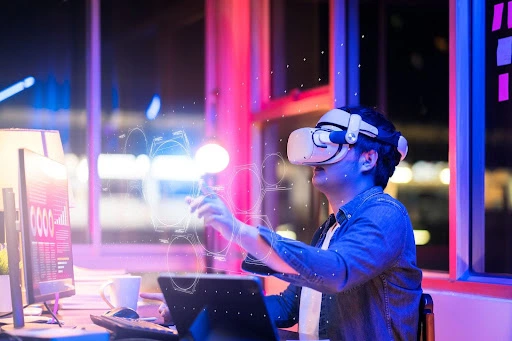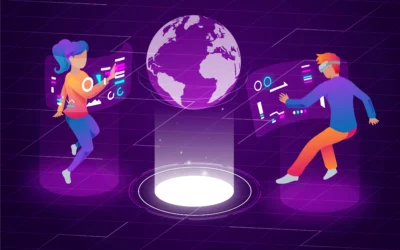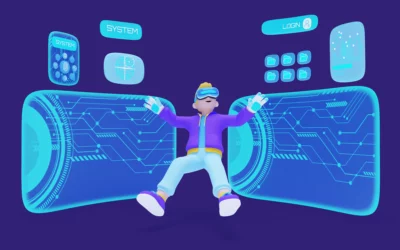In a world where technological advancements are occurring at an unprecedented pace, the year 2024 promises to be a pivotal moment in shaping the future. From cutting-edge innovations in artificial intelligence to groundbreaking developments in sustainable energy, here are the top futuristic technologies that are poised to revolutionize the world in 2024.
1. Quantum Computing Breakthroughs
Quantum computing breakthroughs represent a monumental stride in the realm of computation, with potential implications that transcend the capabilities of classical computing systems. Unlike traditional computers that rely on bits to represent information as either 0s or 1s, quantum computers use qubits, which can exist in multiple states simultaneously due to the principles of superposition and entanglement. This enables quantum computers to process vast amounts of information exponentially faster than their classical counterparts.
Recent breakthroughs in quantum computing have centered on achieving greater stability and scalability, bringing us closer to solving complex problems that were previously deemed impractical. As the technology matures, we anticipate advancements in fields such as cryptography, optimization, and simulation, unveiling new possibilities for innovation and scientific discovery. The race to harness the power of quantum computing is shaping up to redefine the boundaries of computational capacity and propel us into a new era of technological potential.
2. Advanced AI and Machine Learning Applications
Advanced AI and machine learning applications are at the forefront of technological innovation, reshaping industries and daily experiences. In 2024, we witness a sophisticated integration of AI into various facets of our lives. Machine learning algorithms, fueled by vast datasets, empower AI systems to comprehend patterns, make predictions, and adapt autonomously. This evolution leads to applications that extend beyond conventional boundaries, from personalized healthcare diagnostics and predictive maintenance in industries to enhanced natural language processing and image recognition.
In the realm of AI, the emphasis is not only on increased accuracy but also on contextual awareness, allowing systems to comprehend nuanced situations and deliver more refined outcomes. Expect to see AI-driven solutions that optimize processes, automate routine tasks, and provide unparalleled insights across sectors. As these advanced applications continue to evolve, they not only enhance efficiency but also foster a new era of human-machine collaboration, where AI augments human capabilities to solve complex problems and drive innovation.
3. 5G Expansion and Integration
The ongoing expansion and integration of 5G networks mark a pivotal moment in the evolution of telecommunications, promising unprecedented connectivity and transformative possibilities. 5G, or the fifth generation of wireless technology, is characterized by significantly faster data transfer speeds, lower latency, and increased network capacity compared to its predecessors. As 5G networks proliferate globally, users can anticipate a revolutionary shift in the way we connect and communicate, with applications extending far beyond enhanced smartphone experiences.
In 2024, the 5G expansion is not merely a technological upgrade but a catalyst for a new era of connectivity. Beyond the consumer realm, 5G plays a crucial role in powering the Internet of Things (IoT), supporting smart cities, and enabling the connectivity required for autonomous vehicles. Industries ranging from healthcare to manufacturing stand to benefit from the low latency and high data speeds, opening doors to innovations like remote surgery and advanced industrial automation. As 5G integration accelerates, we find ourselves at the brink of a hyper-connected future, where the seamless exchange of information transforms the way we live, work, and interact with the digital world.
4. Biotechnology Advancements
Biotechnology advancements in 2024 are reshaping the landscape of medicine, agriculture, and beyond, showcasing the transformative potential of manipulating living organisms at the molecular and cellular levels. Breakthroughs in gene editing technologies, such as CRISPR-Cas9, continue to revolutionize personalized medicine by allowing scientists to modify DNA with unprecedented precision. This opens avenues for targeted therapies, gene therapies, and the potential eradication of certain genetic diseases.
In agriculture, biotechnology is driving innovations in crop development, leading to more resilient and higher-yielding varieties. From drought-resistant crops to those with enhanced nutritional profiles, biotechnological advancements are instrumental in addressing global food security challenges. Beyond these realms, the convergence of biotechnology with artificial intelligence is fostering accelerated drug discovery processes and contributing to a deeper understanding of complex biological systems. As biotechnology continues to advance, its impact extends far beyond the laboratory, shaping a future where the manipulation of life’s building blocks holds the key to addressing some of humanity’s most pressing challenges.
5. Augmented Reality (AR) Redefining Experiences
In 2024, augmented reality (AR) is not merely a futuristic concept but a transformative force, reshaping how we perceive and interact with the digital and physical worlds. AR overlays digital information onto the real environment, enhancing our experiences in various sectors. From gaming and education to manufacturing and healthcare, AR is becoming an integral tool for delivering immersive and interactive content. In the consumer realm, we witness the proliferation of AR applications that revolutionize shopping experiences, allowing users to virtually try on products or visualize furniture in their homes before making a purchase.
Moreover, AR is contributing to advancements in education by offering interactive and engaging learning experiences. In the industrial sector, AR is streamlining manufacturing processes by providing real-time information and guidance to workers. As the technology matures, we can anticipate even more innovative applications, ultimately blurring the lines between the digital and physical realms. The future holds a dynamic landscape where AR is not just a technological novelty but a fundamental aspect of how we perceive and engage with information and the world around us.
6. Sustainable Energy Innovations
In 2024, sustainable energy innovations are propelling the world toward a greener and more environmentally conscious future. Advances in solar and wind technologies, coupled with breakthroughs in energy storage systems, are redefining the landscape of renewable energy. Solar panels continue to become more efficient and cost-effective, making solar energy increasingly accessible for widespread adoption. Similarly, wind energy technologies, including more efficient turbines and advanced grid integration, are contributing to the growth of clean and renewable power sources.
Energy storage solutions, such as advanced batteries, are addressing the intermittency of renewable sources, providing a means to store excess energy for use during periods of low generation. These innovations not only enhance the reliability of renewable energy but also play a vital role in transitioning away from fossil fuels. With a global focus on mitigating climate change, sustainable energy innovations are at the forefront of creating a more sustainable and resilient energy future for generations to come. The synergy of technological advancements and a commitment to environmental stewardship positions sustainable energy as a cornerstone of a cleaner and more sustainable world.
7. Blockchain Beyond Cryptocurrency
In 2024, blockchain technology has transcended its origins in cryptocurrency, expanding into a multifaceted tool with applications across various industries. Blockchain’s decentralized and secure ledger system is now utilized for more than just financial transactions. Industries such as supply chain management benefit from blockchain’s transparency, traceability, and enhanced security. The immutable nature of blockchain records ensures that each step in the supply chain is verifiable, reducing fraud, errors, and enhancing overall efficiency.
Moreover, healthcare is witnessing the integration of blockchain for secure and interoperable health data management. Patients can have more control over their medical records, and healthcare providers can access a unified and secure database, improving patient care and confidentiality. As blockchain continues to mature, we anticipate its further integration into sectors like legal, voting systems, and intellectual property, revolutionizing the way we manage, secure, and verify data beyond the confines of traditional financial transactions. The future holds a decentralized and trust-enhanced landscape where blockchain technology plays a pivotal role in reshaping how information is managed and transactions are conducted across various domains.
8. Space Exploration and Commercialization
In 2024, the realms of space exploration and commercialization are experiencing an unprecedented convergence of advancements, opening new frontiers beyond our planet. Governments and private entities alike are contributing to an era of increased space exploration, with ambitious missions targeting the Moon, Mars, and even beyond. In particular, commercial space companies are playing a pivotal role, providing launch services, satellite deployment, and contributing to the development of reusable rocket technology. This shift toward commercialization is reducing the costs associated with space exploration, fostering innovation, and expanding opportunities for scientific research and economic ventures in space.
The rise of space tourism is a significant aspect of this commercialization trend, with companies actively working on making space travel accessible to private individuals. This transition from government-led initiatives to a more inclusive and commercially driven space sector signifies a fundamental shift in how humanity engages with the cosmos. As space exploration and commercialization continue to evolve, the dream of human settlements beyond Earth edges closer to reality, ushering in a new era of possibilities for scientific discovery, economic growth, and the expansion of the human presence into the cosmos.
Conclusion
The year 2024 holds the promise of transformative technologies that will redefine the way we live, work, and interact with the world. As these innovations continue to unfold, it’s crucial to consider the ethical, social, and environmental implications to ensure that the benefits are shared by all and contribute to a better future for humanity. The coming years are poised to be an exciting chapter in the ongoing saga of technological progress. Stay tuned for a world where science fiction becomes reality.





